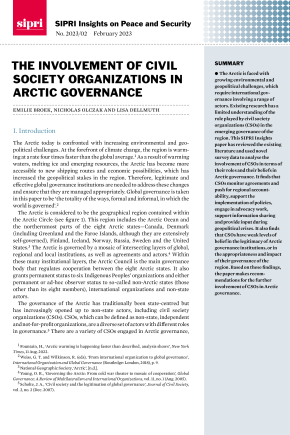The Involvement of Civil Society Organizations in Arctic Governance

The Arctic is faced with growing environmental and geopolitical challenges, which require international governance involving a range of actors. Existing research has a limited understanding of the role played by civil society organizations (CSOs) in the emerging governance of the region. This SIPRI Insights paper has reviewed the existing literature and used novel survey data to analyse the involvement of CSOs in terms of their roles and their beliefs in Arctic governance. It finds that CSOs monitor agreements and push for regional accountability, support the implementation of policies, engage in advocacy work, support information sharing and provide input during geopolitical crises. It also finds that CSOs have weak levels of belief in the legitimacy of Arctic governance institutions, or in the appropriateness and impact of their governance of the region. Based on these findings, the paper makes recommendations for the further involvement of CSOs in Arctic governance.
I. Introduction
II. Conceptualizing Arctic governance
III. CSO involvement in Arctic governance
IV. CSOs’ perceptions of the legitimacy of Arctic governance institutions
V. Recommendations for the legitimacy and future of Arctic governance

